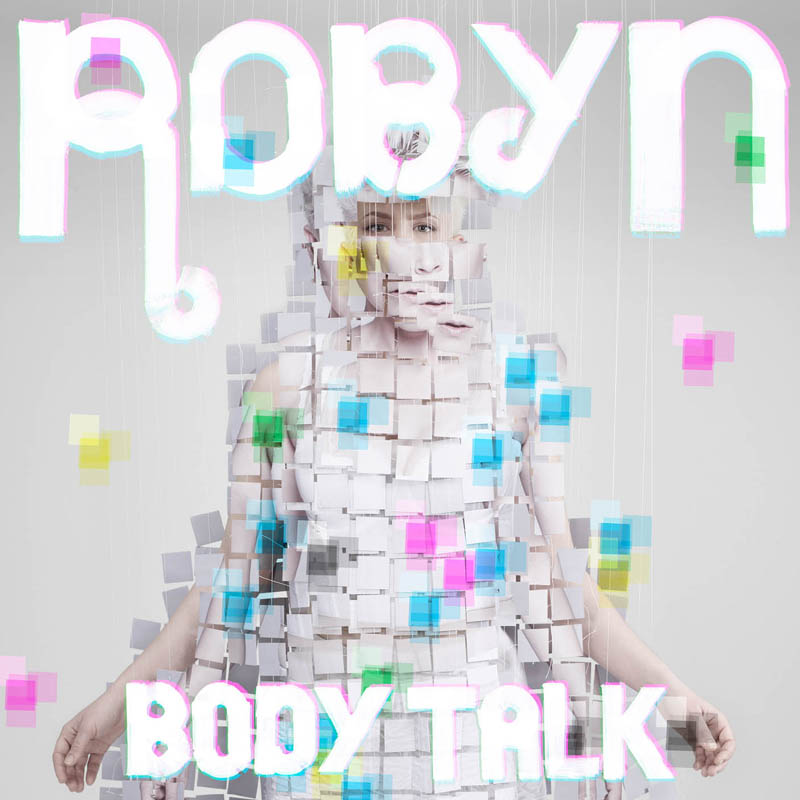I get so dismayed when this Pitchfork-obsessed generation doesn’t remember Robyn as she was back in the ‘90s. They treat her as a new phenomenon, and that—well, frankly, that makes me feel old.
“C’mon you don’t remember Robyn? 1997?”
“Nope.”
“What about ‘Show Me Love’—that black and white video where everyone was involved in a huge makeout sesh?”
“No.”
“Not even ‘Do You Know (What It Takes)’?!”
“Nah.”
Eventually, I had to give up. But boy do I wish that these little tykes could have witnessed Robyn in her prime. Yeah, I said it—her prime, as in, some of her best days. And they’re behind her now. It’s not that she’s bad at what she does today, necessarily, but the lack of soul in her new material is pervasive and difficult to ignore.
Body Talk is a cornucopia of cherry-picked songs from her three-part mini-album series this year, and the compilation approach really comes through: it’s full of varied electropop production that suffers from a lack of cohesiveness. The actual quality of the electro is high, but with Robyn’s often half-hearted vocals and hooks, are the songs any different than your average Kitsune Maison electro track featuring a run-of-the-mill female vocalist?
Here’s the thing: Robyn can sing. Quite skillfully—and nobody remembers it. She was signed to Jive around Britney’s time, and she could’ve given that pop tart a run for her money, with her strong, soulful quasi-Motown chords outshining Spears’ lackluster, tacky soubrette. If anyone deserves the “diva” title, it’s probably Robyn (and the honor is about 13 years overdue—are you reading this, VH1?). Max Martin and BMG might have owned her soul in the ‘90s when she was a teenager, forcing her to turn out glassy pop songs against her will, but A) they were extremely high quality pop songs for that era, and B) they showcased her powerhouse vocals.
Those powerhouse vocals must be playing hide-and-seek on Body Talk, because for the most part, Robyn’s voice is missing-in-action. She sounds thin, fragile, and cold, like she’s really the “fembot” she talks about on the opening track. Speaking of “Fembot,” it’s these empty sprechgesang tracks that hold the album back and make Body Talk a rather embarrassing listen at times. The snappy “Don’t Fucking Tell Me What to Do” and the rather bland, Uffie-like “U Should Know Better” are examples of this, actively making me wish she’d just stick with the singing, however subpar it sounds this time. Her huge voice finally comes through on songs like “Indestructible,” “Dancing on My Own,” and “Get Myself Together”—all glimmers of hope, especially near the larger-than-life choruses. She even sounds heartfelt on those tracks (finally). Why couldn’t she make an entire album of that and scrap all the inexpressive spoken-word stuff?
I’m trying to understand Robyn’s place in the ‘10s. Is she trying to be like M.I.A., showing us this awesome European electronic music, making her vocals and lyrics completely secondary, almost serving as a curator? Is she hoping to push pop forward and become a model for the modern pop star? I would argue for the latter, but Robyn’s music never seems to ascend beyond the indie circles. Why do hipsters like her? Is it because Robyn’s pop isn’t as polished as pop music on Top 40 radio? Make no mistake about it, Top 40 ringleader Max Martin is still present on Body Talk, having co-written “Time Machine,” and he’s still responsible for many of the pop songs you probably hate, like Katy Perry’s “California Gurls,” Taio Cruz’s “Dynamite” and Usher’s “DJ Got Us Fallin’ In Love.” That explains why “Time Machine” feels like it could’ve been sung by anyone. There’s nothing about it that feels distinctly Robyn. Working with Martin again, however symbolic and full-circle, was not a smart move for someone trying to re-position herself as edgy and unique from the rest of the pop world.
Her production team deserves most of the praise for Body Talk–musically, the songs help earn Robyn that “progressive pop” tag. Many of the tracks are driving, sprawling, textured, and neon-like, and overall unpredictable. It’s much more preferable to the current 808-obsessed, auto-tuned radio culture where every song is either produced by Dr. Luke or will.i.am. The gritty, vintage production from Diplo on “Dancehall Queen” stands out as one of the album’s best examples, but the dancehall dubstep doesn’t really suit Robyn on an individual level. The reggae-like cadence in her delivery completely takes away from her vocals and undermines her talent, making me wonder if she really is taking on more of a curatorial role for all this music. M.I.A. does it. Uffie does it. The trend is not unusual.
Robyn has a quirky image and fantastic producers, but she keeps showing up with some unremarkable, semi-awkward songwriting. To be fair, she’s still in the process of resurfacing, rather successfully actually, and Body Talk is a fine dance-pop album. She just has a long way to go before she pours the right amount of soul and emotion into her music and establishes her own style instead of borrowing everyone else’s. I have no doubt that, eventually, we’ll see Robyn as a legitimately influential pop diva once again.

